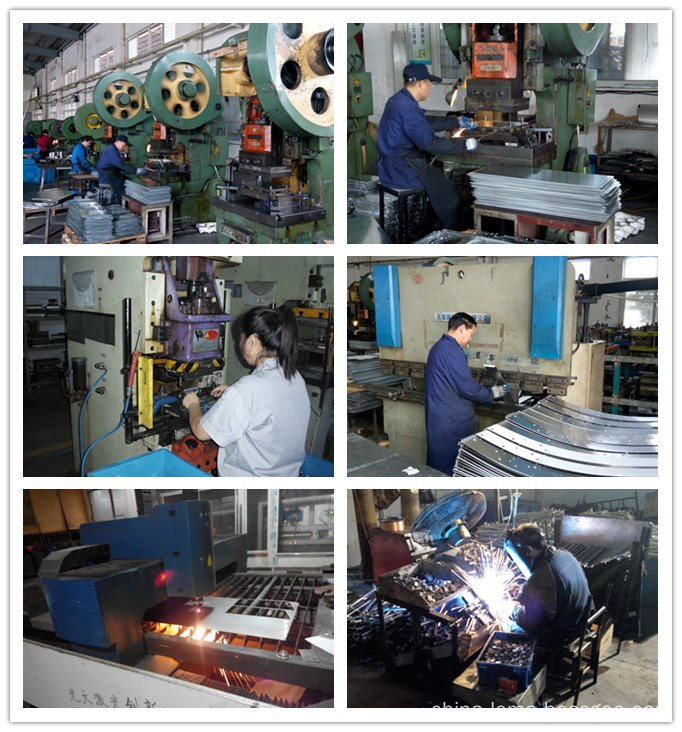From January to July this year, the overall production value of China's machine tools and accessories fell
Stamping is a kind of process
that obtaining the required
shape and size of the parts by outside force on the metal sheet, strip, pipe shape material use mould and press machine,
in order to produce plastic deformation or separation. Stamping and
forging belong to plastic processing (or pressure processing), called the
forging press. The mainly stamping billets are hot rolling and cold rolling
steel plate and steel belt.
Stamping processing is a
production technology that use of conventional or special equipment of the
power, make the deformation sheet metal deformation in the mould. Thereby
produce a certain shape, size and performance parts. Sheet metal, stamping
mould and equipment are the three elements of stamping.
Stamping characteristics:
Compared with the castings,
forgings, stamping parts have the thin, uniform, light and strong characteristic. Stamping can make other methods are difficult to manufacture, such
as rib stiffener, flanging, ups and downs, or flanging products, in order to improve its stiffness. Because use precision mould, the
precision of part can reach micron grade, and repeat precision is high, the
specification is consistent, can punch a hole nest, convex sets, etc. Cold
stamping generally no longer by machining, or only need a small amount of
machining. Hot stamping precision and surface state is lower than the cold
stamping parts, but it's still better than the castings, forgings, less cutting
processing capacity.
The Advantage of stamping:
(1) The stamping process is high production efficiency, and easy
to operate, easy to realize mechanization and automation.
The process classification
of stamping:
Stamping is mainly classification by process, can be divided into
separation process and forming process. Separation process is also called the
blanking, and its purpose is to make the sheet metal of stamping parts
separated along the contour line, and at the same time guarantee the quality of
the separation section requirements. Forming process is designed to make sheet
metal occurred plastic deformation under the condition of not to break the
billet, made into the required shape and size of parts. In the actual
production, it is often a variety processes integrated applied to one part. Cutting,
bending, shear, deep drawing, bulging, spinning, correction are the main
stamping processes.
The conventional material of stamping part: Aluminum sheet like 6061,6063, stee alloy sheet like Q235, ST37-2, Stainless steel sheet like SS304,SS316;
The precision of the
stamping part: ±0.1mm;
The thickness of the metal
sheet we can do: 0.5mm~12mm;
The max size of the
stamping part in my factory: 1mX1m;
Surface preparation methods: Powder coating, Painting, Plating,
Electrophoresis, Polishing.
The Metal stamping and QC control equipment
Metal Stamping Parts, Precision Metal Stamped Parts, Steel Stamping Parts, Stainless Steel Stamping Parts, Aluminum Stamping Part NINGBO BEILUN LEMA MACHINERY TECHNOLOGY CO.,LTD , http://www.china-lema.com
According to reports, from January to July 2012, the sales value of China's machine tool industry fell sharply for the sixth consecutive year. Among them, the growth rate of the foundry machinery manufacturing, machine tool accessories manufacturing, and other special equipment manufacturing industries accounted for a relatively large decline, with the year-on-year growth rates falling by 27.72, 31.1, and 25.65 percentage points respectively.
From January to July 2012, China's machine tool industry completed industrial output value of 430.951 billion yuan, an increase of 11.77%; completed sales value of 419.107 billion yuan, an increase of 11.75%; production and sales rate was 97.23%.
From January to July 2012, the export value of China's machine tool industry was 23.72 billion yuan, an increase of 7.20% year-on-year, a decrease of 13.8 percentage points from the same period of last year.
From the perspective of the output of major products, in July, the output of CNC machine tools in the machine tool industry saw a slight increase year-on-year, while the growth rate of other industries declined.
Today, although China's machine tool industry ranks first in the world, it is still the world's largest importer. China's high-end machine tools are mainly based on imports. Although we have a very good industrial chain, we have the disadvantage of high-end quality. Machine tool products.
All this shows that we must accelerate the pace of innovation and upgrading of machine tool technology, which will also become the most important task of our country's manufacturing industry. Of course, these must be coordinated by our country's policies and enterprises, strengthen management, seek breakthroughs, and constantly make breakthroughs. Constantly innovate and strive to usher in a comprehensive and comprehensive growth of the machine tool accessories industry in 2012.
(2) The mould ensure the
stamping precision of the size and shape when stamping, and generally does not
destroy the surface of the quality of stamping parts , and the life of the
mould are long, so the stamping quality is stable, has the characteristics of
"the same".
(3) The stamping can produce the part that
size range is larger, more complex shape parts, such as small to stopwatch of
watch, big to Auto longeron, cover parts, etc., and stamping material hardening
effect of cold deformation, the strength and stiffness of stamping is high.
(4) Stamping generally has no chip broken
material, material consumption is less, and do not need other heating equipment,
it is a kind of machining method that material saving, energy saving, stamping
parts cost is low.

